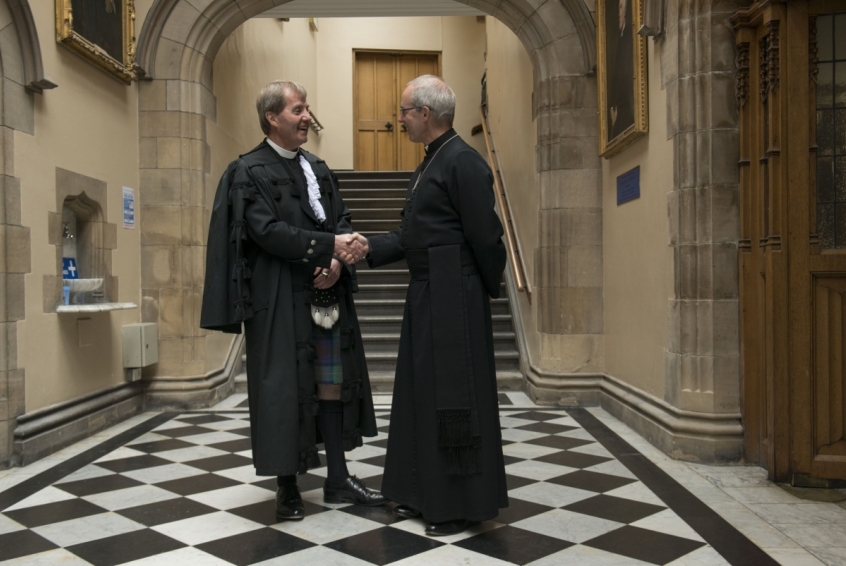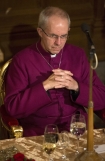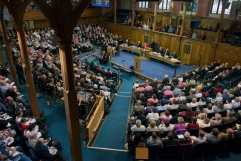
Until now, possibly the most difficult doctrine that Christians have struggled to understand is the doctrine of the Trinity.
This must be close to being surpassed in its mystery by the latest pronouncements from the Church of England and the Church of Scotland.
The Church of Scotland this week decided to recognise the ministry of clergy in same-sex marriages. At present, these same clergy are not, however, allowed to celebrate same-sex marriages for the laity.
At the same meeting of the General Assembly in Edinburgh, the Church of Scotland agreed the Columba Declaration, This recognises that "in both our churches the word of God is truly preached, and the sacraments of Baptism and the Holy Communion are rightly administered". In addition, it enables ordained ministers "from one of our churches to exercise ministry in the other church".
The Church of England does not allow its clergy to convert same-sex civil partnerships to marriage. And it has been enforcing this pretty strictly. Canon Jeremy Pemberton, a hospital chaplain, lost his licence after he married his partner, which effectively lost him a new job offer at the same time. Last year he also lost an employment tribunal on the case.
Perhaps he should now move to Scotland and work for the Kirk.
David Robertson, of the Free Church of Scotland, wrote on his blog: "The Church of Scotland has cut itself off from most of the worldwide church – the Catholic, Orthodox and Evangelical churches are opposed to SSM. Both the Presbyterian Church of Ireland and the Australian Presbyterian Church warned there would be consequences, but to no avail."
It has clearly not cut itself off from the Church of England. Quite the opposite.
Yet the Church of England, under the leadership of Archbishop Justin Welby, has taken a consistently conservative line with its own flock and set a conservative standard for the wider Anglican Communion. The Primates Meeting last January imposed "consequences" on The Episcopal Church in the US for its liberal stance on the issue. Other Anglican provinces have pulled back since then.
So what will the Scottish Episcopal Church do when it debates this very issue next month?
And will the hurt in this Church over the Columba Agreement impact the discussion at all, prompting a revenge factor in the vote?
Probably not, given what good Christians they all are and how much they love each other. And especially not, now that Archbishop Welby has made a public and heartfelt apology for the "consternation and deep hurt" caused by the way the declaration was announced.

In his speech to the General Assembly, Archbishop Welby also mentioned next year's Reformation Jubilee, the 500th anniversary of the date in October 1517 when Martin Luther nailed his Ninety-Five Theses to the door of All Saints' Church in Wittenberg, kicking off the Reformation.
Ian Paul, a member of the Archbishops' Council, suggests that "things go seriously wrong in the quest to justify same-sex marriage within Christian theology and ethics." He cites scholarship suggesting the Scottish Episcopal Church has shrunken to a "radical Protestantism".
If a radical Protestantism is indeed at the root of these difficulties, it will be enlightening to witness, in the coming celebrations, how these churches, their traditional "frenemies" and their new friends explain Luther's own views on homosexuality.
He was unequivocal.
On the story of Sodom in Genesis, he fulminated on the departure "from the natural passion and longing of the male for the female" as "altogether contrary to nature". Luther described it as a "perversity" that comes "undoubtedly from Satan". (Luther's Works, Vol. 3, 255)
People loved the present Pope when when he cut through the complexity and simply said: "If a person is gay and seeks God and has good will, who am I to judge?"
On the Trinity, when clergy want to put it simply, they say the Trinity is just one way of talking about God.
That also is helpful for its simplicity.
There must be many in the Church of England as well as the Scottish Episcopal Church feeling a bit put out by so many apparent contradictions from churches as they struggle to deal with complex contemporary issues.
What is happening at present is not remotely helpful to mission.
It is surely most baffling of all to the young, the missing generations. These are the people that all the churches are at one in wanting to reach out to. They are united in this at least.
Perhaps if radical ecumenism of the kind in the Columba Declaration can serve any purpose long term, it will be to bring long-term unity on some of these other issues as well.















